新概念(一)教研L1-96
新概念一册讲义1-144备课讲稿
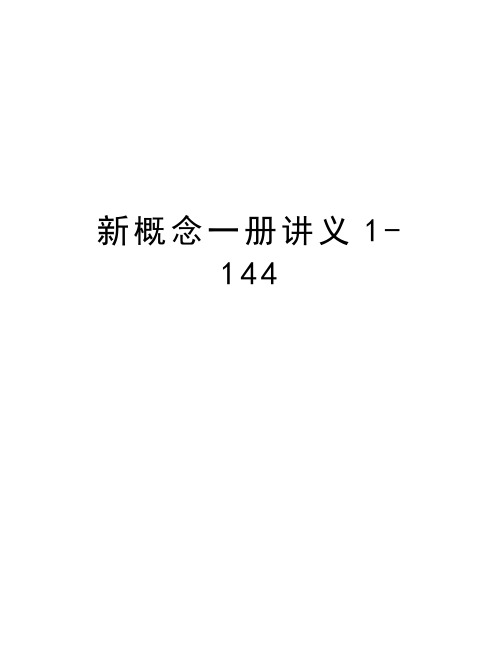
新概念一册讲义1-144一、难点及重点词:excuse 原谅 pardon 原谅,请再说一遍二、重点句子:1.Is this your handbag ?2.pardon = I beg your pardon ?3.Yes, it is .三、重要知识点:1.Excuse me 与 sorry的区别:me: I 的宾格.Excuse me: 为了引起别人的注意力,而用的客套说法,事前使用。
Sorry: 犯错误之后,事情发生后的使用。
2.Yes. 是的→ 什么事(本课)用升调读。
3.Yes, it is. Yes,是的,肯定回答。
it 指上文的handbag.4.Thank you very much = Thanks a lot. 答语:You’rewelcome.5.be动词用法歌:我是am,你是are,is用于她,他,它,单数is,复数are.6.pardon = I beg your pardon ?四、语法:一般疑问句Is this your handbag ? be动词的一般疑问句,用yes/no回答的疑问句:①一般疑问句相当于我们汉语中的问句,以“吗”结尾。
② be包括is, am, are “是”③由肯定句转化成一般疑问句的步骤为:⑴把be动词提前,小写变大写.⑵主语移后大写变小写.⑶后面不动落下来.⑷句号变问号,降调变升调.L3~L4讲义:难词及重点词:L3~L4讲义:一、难词及重点词:umbrella伞 my我的ticket票 cloakroom衣帽存放处daughter女儿二、重点句子:1.My coat and my umbrella please.Please give me my coat and my umbrella.2.This is not my umbrella.3.Is this your umbrella ?4.Is this it ?5.Here is my ticket.三、重要知识点:1.区分sir/Mr.Mr.需和姓连用,用在姓前,如Mr. WuSir可单独使用,Yes, sir. 与姓连用时,放在姓后, 如Zhang sir.2.Here’s = Here isHere’s 区分this is 这是… :This is : 东西在这摆着,静止。
新概念第一册每一课重点的总结1
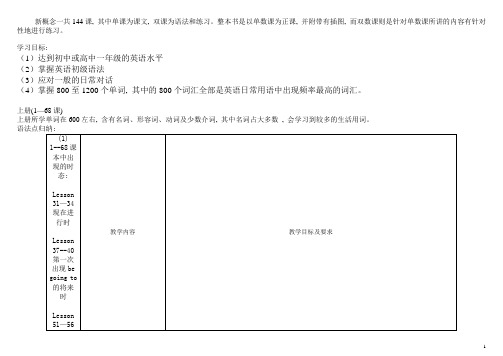
新概念一共144课, 其中单课为课文, 双课为语法和练习。
整本书是以单数课为正课, 并附带有插图, 而双数课则是针对单数课所讲的内容有针对性地进行练习。
学习目标:
(1)达到初中或高中一年级的英语水平
(2)掌握英语初级语法
(3)应对一般的日常对话
(4)掌握800至1200个单词, 其中的800个词汇全部是英语日常用语中出现频率最高的词汇。
上册(1—68课)
上册所学单词在600左右, 含有名词、形容词、动词及少数介词, 其中名词占大多数, 会学习到较多的生活用词。
中册(69—106课), 大约有300单词, 包含名词、动词、形容词、副词、介词, 其中所学的动词和副词会有所增加。
课文中出现的时态有:
Lesson 67—76 为一般过去式
Lesson 83—90 为现在完成时
Lesson 91—96 为一般将来时
下册(107—144课), 大约有300个单词
1、语法点归纳:
2、L107-108形容词的比较级, 最高级
3、L117-118时间状语从句和过去进行时
4、L121-122定语从句
5、L119-120 过去完成时
6、L139-140宾语从句
7、L141-144被动语态。
新概念一册96课电子版本

一般过去时例句及结构
I went to Beijing a year ago . I didn’t go to Beijing a year ago. Did you go to Beijing a year ago? Yes, I did. No, I didn’t .
肯定句 : 主语+动词过去式 否定句: 主语+ did+动词原型 一般疑问句: Did + 主语+动词原型 肯定回答: Yes, 主语+ did. 否定回答: No, 主语+ didn’t.
Yes, I will.
肯定回答: Yes, 主语+ will.
No, I won’t .
否定回答: No, 主语+ won’t .
此课件下载可自行编辑修改,仅供参考! 感谢您的支持,我们努力做得更好!谢谢
Rome was not built in a day . 罗马不是一天建成的。
Seoul
首尔韩国首都
[səʊl] 昌德宫 又名乐宫
Stockholm ['stɒkhəʊm]
斯德哥尔摩 瑞典首都 斯德哥尔摩市政厅
Sydney ['sɪdnɪ] 悉尼 澳大利亚最大城市 悉尼歌剧院
Canberra ['kæ nbərə] 首都是堪培拉
一般将来时例句及结构
I will go to Beijing in a year’s time. 肯定句: 主语+ will +动词原型
I won’t go to Beijing in a year’s time. 否定句: 主语+won’t +动词原型
Will you go to Beijing in a year’s time? 一般疑问句: Will + 主语+动词原型
新概念第一册第95、96课PPT课件

.
20
Lesson 96
When did he go to…? When will he go to…?
a minute/ two minutes an hour/ two hours a day/ two days ago a week/ two weeks a month/ two months a year/ two years
Because the clock of the station is ten minutes slow.
.
10
GEORGE : Two return tickets to London, please. What time will the next train leave?
ATTENDANT: At nineteen minutes past eight. GEORGE : Which platform? ATTENDANT: Platform Two. Over the bridge.
.
6
★ station
• n. 车站,火车站 • a railway station 火车站 • a bus station = a bus stop 公共汽车站
• Could you tell me the way to the station? • 你能告诉我往车站怎么走吗?
.
7
★ catch
• You sent me a postcard, in return, I sent you a postcard too.你给我寄来明信片,我也回寄一张明信片 。
• v. 3)回到
• I’ll return at 10 this evening.
• Will you return my car key?
新概念英语第一册L95~96
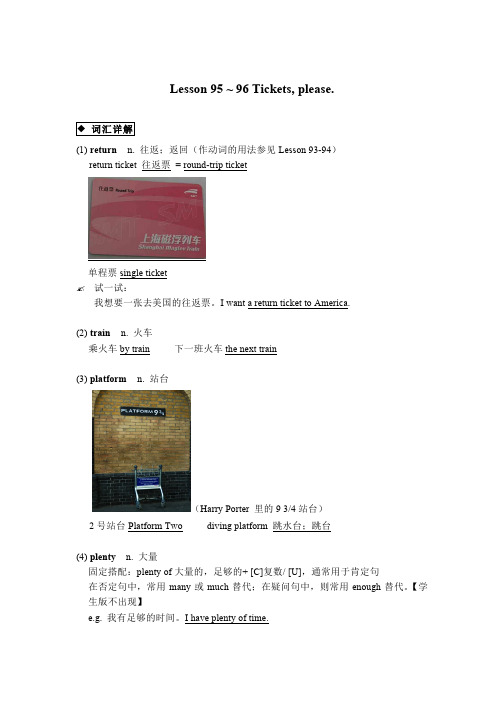
Lesson 95 ~ 96 Tickets, please.◆ 词汇详解(1) return n. 往返;返回(作动词的用法参见Lesson 93-94)return ticket 往返票= round-trip ticket单程票single ticket!试一试:我想要一张去美国的往返票。
I want a return ticket to America.(2) train n. 火车乘火车by train 下一班火车the next train(3) platform n. 站台(Harry Porter 里的9 3/4站台)2号站台Platform Two diving platform 跳水台;跳台(4) plenty n. 大量固定搭配:plenty of大量的,足够的+ [C]复数/ [U],通常用于肯定句在否定句中,常用many或much替代;在疑问句中,则常用enough替代。
【学生版不出现】e.g. 我有足够的时间。
I have plenty of time.(5) bar n. 酒吧【学生版不出现】文化背景:访问英国的人会发现传统英国酒吧是最能领略当地文化的地方。
但对于初来乍到的异国人来说,这些友善的酒吧却犹如潜藏着有惹事危险的"地雷区"。
一位人类学家和一组研究人员揭示了某些鲜为人知的英国酒吧文化。
人们首先遇到的困难是从买酒开始的。
大多数英国酒吧都没有酒保,你得到吧台去买酒。
这听上去似乎让人觉得不方便,可却有它深刻的内涵。
在因其冷漠而出名的英国社会里,酒吧文化的形成是为了促进社会交往。
排队的时候可以和其他等待买酒的人交谈。
在英伦诸岛上,和陌生人亲切地交谈被认为是完全适宜的正常行为的唯一场所可能就是吧台了。
“你如果没去过酒吧,那就等于没有到过英国。
"这对那些想要领略"英国生活和文化核心部分"的人是一种行为准则。
酒吧主要有以下几种形式:主酒吧(main bar),服务酒吧(service bar),宴会酒吧(banquet bar),绅士酒吧(gentleman bar),会员制酒吧(club bar),鸡尾酒廊(cocktail lounge),酒馆(tavern)。
新概念第一册1--100课内容总结 学期汇报课课件
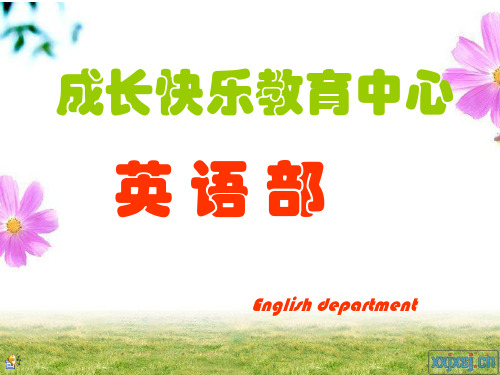
规则二
规则三 规则四
过去式的读音
e.g. walked, jumped 在清辅音后面(除外)读/t/ 在浊辅音和元音后读/d/ 在/t/,/d/后读/id/ e.g. washed, watched e.g. waited, hated
动 词
1) 表示动作中状态的词叫做动词。 2) 根据其在句中的功能,动词可分为四类,分别是:实义 动词(Notional Verb)、系动词(Link Verb)、
你们 you
他们 they
you
them
your
their
yours
theirs
yourselves
themselves
There be 和 祈使句There be句型
一.定义:“There be”是表示“存在”的一种基本方式, 其句型结构通常为::There be + sb./sth. + somewhere/doing sth somewhere There are two books on the desk. 课桌上有两本书。 There are many sheep bleating in the field. 田里有许多绵羊在叫。
规则3
现在进行时 表示现在正在进行的动作。 构成: 一般过去时 主语+be动词+动词的现在分词+其它成分(
动词现在分词
一般动词加-ing 规则一 e.g. look—looking, read—reading, play—playing
规则二 以不发音的字母结尾的单词去e加-ing e.g. make—making, take—taking, arrive—arriving 规则三 重读闭音节词结尾, 即单词中只有一个元音字母,其后紧跟一个辅音字母的词, 双写辅音字母再加-ing e. g. run—running, sit—sitting, get—getting, swim—swimming, stop--stopping
新概念一L95-96教学文案
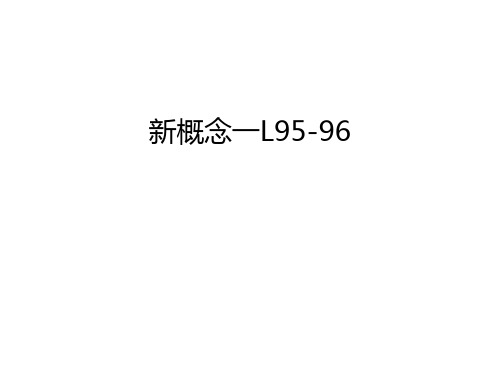
A. will gives B. will give C. gives D. give
7. Who _____D___ we ________ swimming with tomorrow afternoon? A. will; go B. do; go C. will; going D. shall; go
• return • train • platform • plenty • bar • station • porter • catch(caught, caught) • miss
员
n. 站台 n. 大量 n. 火车 n. 车站,火车站 n. 酒吧 v. 赶上 n. 往返 v. 错过 n. 收票员,乘务
8. We ____B____ the work this way next time. A. do B. will do C. going to do D. will
doing 9. Tomorrow he _____A___ a kite in the open air
first, and then ________ boating in the park. A. will fly; will go B. will fly; goes C. is going to fly; will goes D. flies; will go
• return
• 1) 往返 • return ticket • 往返票
• 2) in return • 作为回报 • 3)回到 • return from…to… • 从…回到… • return sth to sb = return sb sth • 把…归还某人
新概念一册语法知识点

新概念一册语法知识点备注:1.主格通常放在句子最前面 e.g: We are friends.2.宾格放在动词或介词后面e.g: Tell me please.(tell是动词) This book is for him.(for是介词)3.4.5.形代+L3-41234L5-6:1.a/an(2.用L7-8:口诀:beI amThe bookit is=it’sL9-10:adj形容词的用法1.adj常与be动词搭配 e.g: It is hot.2.adj常修饰名词n. e.g: I am a beautiful girl.(beautiful修饰girl)L11-12:一、名词所有格:表示某个人的......用法:1.在名词词尾加上’s(有生命的)the boy’s bag2.以s结尾的复数名词,直接加’ teachers’ day3.不以s结尾的复数名词,加上’s children’s day4.A+B’s=共同拥有(后面的名词可单可复)Annie and Lily’s room/rooms.A’s+B’s=分别拥有(后面名词用复数)Annie’s and Lily’s rooms.二、特殊疑问词:7W1H三、对划线部分提问(特殊疑问句):想、找、抄、变L151.2.(1(2(3(4(5L171.man-men woman-women child-children mouse-mice tooth-teeth foot-feet Chinese-Chinese Japanese-Japanese sheep-sheep fish-fish deer-deer2.单数句变复数句秘诀:主语变复数,be改为are, 名词变复数,去掉a/anI am a teacher. We are teachers.L19-20:there be 句型表示某地有某物单数句There is a dog in the park.复数句There are some dogs in the park.变否定:be后加not There is not(isn’t) a dog in the park.There are not(aren’t) any dogs in the park.变疑问:be提前Is there a dog in the park? Are there any dogs in the park?备注:1.there be遵循就近原则There is a teacher and 10 students in the classroom.There are 10 students and a teacher in the classroom.2.不可数名词使用单数。
新概念第一册Lesson95-96精品课件

Reading the text
1 1. What time will the train leave?
At nineteen minutes past eight. 2 2.Which platform and what time will the next
train leave?
Platform Two and at eight nineteen. 3 3.What’s the time now?
No, 主语+ won’t.
特殊疑问: When will +主语 v原型.? …要在什么时候…? What time will + 主语 do? …要在什么时候/打算…?
1.There ______C____ a meeting tomorrow afternoon.
A. will be going to B. will going to be
• a police station 警察局
• a fire station
消防队
• a gas station
加油站
• a TV station
电视台
porter n.乘务员;行李员
catch
• 1) v. 捕捉,逮捕 • We caught a thief on the bus today. • 在公共汽车上我们抓住一个小偷。 • I caught five fish today. • 我今天钓了五条鱼 • 2)v. 及时赶上,赶得上,追上 • I ran to catch the last bus. • 我跑着赶上了最后一班车。
6. Mother _____B___ me a nice present on my next birthday.
新概念一册全册大纲(普通班)
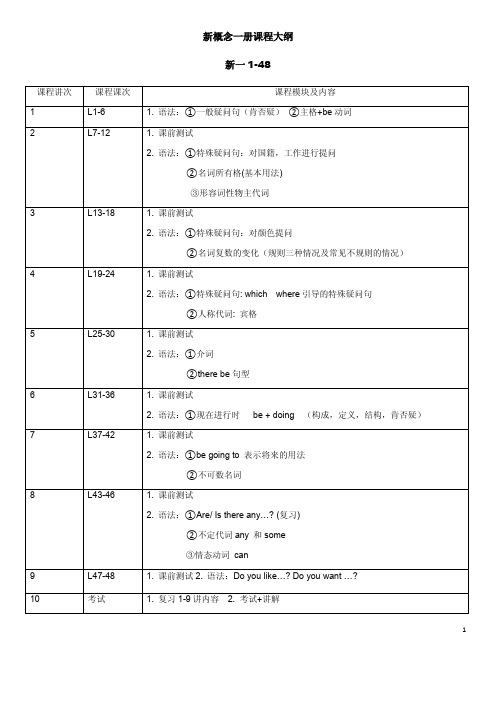
1.语法:情态动词 can,could,may,might,must&have to, had better 2. E-reading: Animals in winter1 1. 语法:被动语态:(一般现在时,一般过去时,一般将来时,现在完成时) 2. E-reading: Animals in winter2 1. 语法:①宾语从句(陈述,疑问,直引变间引) 2. E-reading:What do animals eat? 1. 语法: ①定语从句(基本用法 who,which,that) ②条件状语从句(主将从现) 2. 期末考试
2
L107&73 单词: 形容词
3
L97&115 单词: 家庭成员
1. 课前测试 2. 语法: ①代词(定义,人称代词用法及排序,物主代词,反身代词,it 三指,不定代词 ②数词(定义,分类,基数词读数和时间表达法,序数词日期表达法) 3. E-reading:My first sleepover 1
7
L69-70
语法:①时间介词 ②复习 there be 句型 期中考试
8
L71-72
1. 语法:一般过去时(动词过去式的构成&时间标志词)
9
L73-74
语法:① 副词的用法 ②复习一般过去时(动词过去式)
10
L75-78
1. 课前测试 2. 语法:① 一般过去时(时间状语) ②情态动词的否定疑问句 ③复习时间介词
2
14
L89-92
1. 语法:现在完成时(3) 2. 期末考试
15
L93-96
1. 课前测试 2. 语法:①一般将来时(时间状语,疑问句)②对时间提问 ③had better 的用法
新概念第一册L95-96

n. 往返 n. 火车 n. 站台 n. 大量 n. 酒吧 n. 车站,火车站 n. 收票员,乘务员
catch
(caught, caught) v. 赶上
miss
v. 错过
让家成为孩子钟爱的课堂
re turn tr ain plat form pl en ty b ar st a tion port er cat ch(caught, caught) miss
让家成为孩子钟爱的课堂
bar
酒吧
e.g I went to bar last night. 我昨晚去了酒吧。
让家成为孩子钟爱的课堂
plenty [ˈplenti]
n. 大量,许多 plenty of… 后接可数名词或不可数名词 There is plenty of milk in my cup. 我杯里有许多牛奶。 There are plenty of students in the classroom. 教室里有好多学生。
让家成为孩子钟爱的课堂
train
1) n. 火车 乘火车去… take the train to … 我们要搭下午2点的火车去北京。 We’ll take the 2:00 p.m. train to Beijing. 2)v. 训练,培养 他为了比赛在训练那匹马。 He is training the horse for the race. 你应该教导你的孩子如何尊重别人。 You should train your children how to respect others.
You sent me a postcard, in return, I sent you a postcard too. v. 3)回到 return from…to… 从…回到… return sth to sb = return sb sth 把…归还某人 return to sp 回到某地
新概念1-96课知识摘要
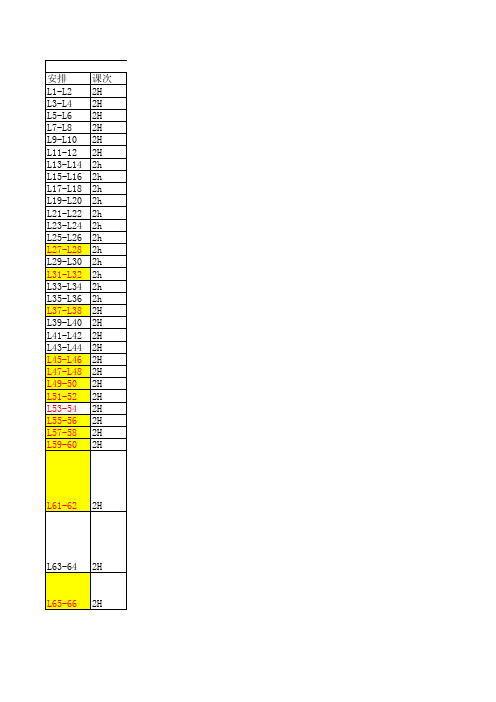
L95-962H
(常与of连用,后接可数名词或不可数名词)
Eg:There is plenty of milk in my cup .
There are plenty of students who can speak English .
同义辨析:plenty of , a lot of , many , much
Plenty of后接可数名词或不可数名词,如上。
a lot of / lots of既可接可数名词又可接不可数名词,也可跟抽象的或者表示物质的名词。
Eg:What will you do if you win a lot of money ?
many 许多,修饰可数名词。
Eg: There are many books on the table .
Much许多,修饰不可数名词。
Eg: He hasn’t much money left .
1. have got = have , has got = has
2. had better 最好,表示“建议或忠告”它
没有人称和数的变化,后面接动词原形,缩写形式是’d better , 其否定形式是:had
better not 最好不要…
3. in 在…之后,用于一般将来时态中。
Eg:
His father will be back from London in a few days
2%。
新概念英语第1册第95-96课语法与词汇详解
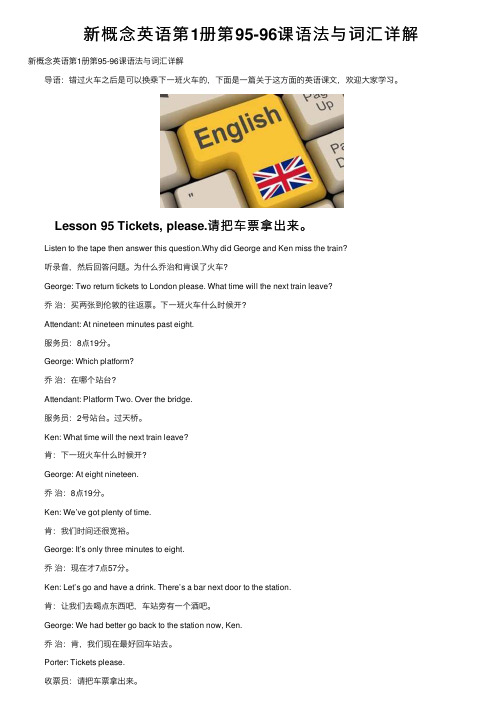
新概念英语第1册第95-96课语法与词汇详解新概念英语第1册第95-96课语法与词汇详解 导语:错过⽕车之后是可以换乘下⼀班⽕车的,下⾯是⼀篇关于这⽅⾯的英语课⽂,欢迎⼤家学习。
Lesson 95 Tickets, please.请把车票拿出来。
Listen to the tape then answer this question.Why did George and Ken miss the train? 听录⾳,然后回答问题。
为什么乔治和肯误了⽕车? George: Two return tickets to London please. What time will the next train leave? 乔治:买两张到伦敦的往返票。
下⼀班⽕车什么时候开? Attendant: At nineteen minutes past eight. 服务员:8点19分。
George: Which platform? 乔治:在哪个站台? Attendant: Platform Two. Over the bridge. 服务员:2号站台。
过天桥。
Ken: What time will the next train leave? 肯:下⼀班⽕车什么时候开? George: At eight nineteen. 乔治:8点19分。
Ken: We’ve got plenty of time. 肯:我们时间还很宽裕。
George: It’s only three minutes to eight. 乔治:现在才7点57分。
Ken: Let’s go and have a drink. There’s a bar next door to the station. 肯:让我们去喝点东西吧,车站旁有⼀个酒吧。
George: We had better go back to the station now, Ken. 乔治:肯,我们现在最好回车站去。
最新新概念英语第一册95-96课件
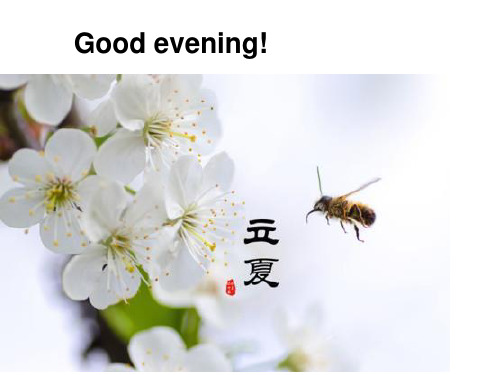
最新新概念英语第一册95-96课件
最新新概念英语第一册95-96课件
Exact time
gorelteuaacrrnvoriemvftloeye ittnoo
最新新概念英语第一册95-96课件
Lesson95 Tickets, please.
最新新概念英语第一册95-96课件
ticket
single ticket return ticket
Good evening!
最新新概念英语第一册95-96课件
How are you ?
最新新概念英语第一册95-96课件
How ma1ny mo4nths can you3 see?
May
最新新概念英语第一册95-96课件
Which season is it now ?
spring
summer
最新新概念英语第一册95-96课件
time
• a minute ago • two minutes ago • an hour ago • two hours ago • a day ago • a week ago • a month ago • a year ago
• in a minute’s time • in two minutes’ time • in an hour’s time • in two hours’ time • in a day’s time • in a week’s time • in a month’s time • in a year’s time
autumn winter
最新新概念英语第一册95-96课件
fall
What's the date today ?
新概念一册96课

ninth 9 th eleventh 11 th
二 学习下列表示时间的时间状语 1 时间段+ ago a year ago 一段时间以前 一年 前
2 in +时间段’s +time = in + 一段时间 一段时间以后 in a year’s time= in a year 一年后
一般过去时时间状语
in a year’s time
in two months’ time
in two years’ time
New words
• 帕特农神庙 Athens ['æθ ənz]
雅典
希腊首都
Beijing 北京 中国首都
Berlin [bɜ:ˈlɪn] 柏林 德国首都
柏林大教堂 柏林最大的教堂rststsecondndthirdrdfourththfifththsixththsevenththeighththninththtenth10theleventh11thtwelfth12th二学习下列表示时间的时间状语时间段ago一段时间以前yearago一年前时间段stime一段时间一段时间以后yearstimeyear一年后一般过去时时间状语一般将来时时间状语minuteagotwominutesagominutestimehouragotwohoursagohourstimetwohourstimedayagotwodaysagodaystimetwodaystimeweekagotwoweeksagoweekstimetwoweekstimemonthagotwomonthsagomonthstimetwomonthstimeyearagotwoyearsagoyearstimetwoyearstimenewwordsathensnz雅典希腊首都beijing北京中国首都berlin柏林德国首都柏林大教堂柏林最大的教堂bombaybei孟买印度首都五层楼953扇窗geneva日内瓦瑞士首都万国宫联合国在欧洲的总部london?l?nd?n伦敦英国首都大本钟madrid马德里西班牙首都马德里皇宫moscow?m?sk??莫斯科俄罗斯首都克林姆林宫newyork纽约美国最大城市washington华盛顿paris巴黎埃菲尔铁塔法国首都rome罗马意大利首都罗马斗兽场rome罗马不是一天建成的
新概念一册L95-96

Today,we’ll listen to a story about how George and Ken miss a train.
2018/8/20
First listen then answer these questions.
1.Why did George and Ken miss the train?
2018/8/20
5.It is over___from Shijiazhuang to Beijing. A.three hours' drive B.three hour's drive C.three hours' drives D.three hours drive 6.It's not fine today.You'd better__out.Why___stay at home watching TV. A.not to go\not B.not go\not C.don't go\不填 D.to not go\不填
2.What's the time when they arrive at the train station?
3.Which platform should they get on the train?
2018/8/20
Notes on the text
1.Two return tickets to London , please.
I’ll fly to Beijing in two days’ time.
2018/8/20
1.You_____miss the last bus. A.not had better B.had better not C.had not better D.had no better
- 1、下载文档前请自行甄别文档内容的完整性,平台不提供额外的编辑、内容补充、找答案等附加服务。
- 2、"仅部分预览"的文档,不可在线预览部分如存在完整性等问题,可反馈申请退款(可完整预览的文档不适用该条件!)。
- 3、如文档侵犯您的权益,请联系客服反馈,我们会尽快为您处理(人工客服工作时间:9:00-18:30)。
Lesson1.一.单词。
1. excuse 原谅2.me 我3. yes 是的4. this 这个5.. is be动词现在时第三人称单数。
6. your 你的,你们的7. it 它8. handbag 手提包9. Thanks you 谢谢10. pardon 原谅,请再说一遍。
11. very much 非常地二.句子。
1.-- Is this your handbag? 这是你的手提包吗?-- Yes, it is . 是的,它是。
2. Excuse。
对不起。
3. Pardon? 请再说一遍。
Lesson 2 Is this your…?一.单词。
1.pen 铅笔2. pencil 铅笔3. book 书4. watch 手表5. coat 上衣,外套6. dress 连衣裙7. skirt 裙子8. shirt 衬衣9 car 小汽车10. house 房子。
Lesson3 Sorry ,sir一.单词。
1. umbrella 雨伞2. please 请3. here 这里4. my 我的5. ticket 票6. number 号码7. five 五8. sorry 对不起9. sir 先生10. cloakroom 衣帽存放处。
二句子。
1.Herre is my ticket. 这是我的票。
2.Here’s your umbrella. 这是你的雨伞。
3.This is my umbrella. 这是我的雨伞。
This is not my umbrella. 这不是我的雨伞。
Is this your umbrella? 这是你的雨伞吗?Lesson 4. Is this your…一.单词。
1.suit 一套衣服。
2. school 学校3. son 儿子4. daughter 女儿二.语法一般疑问句。
It’s this your…?Lesson5 Nice to meet you.1、mr(先生)2、good(好)3、morning(早晨) 4.、miss(小姐)5、new(新的)6、student(学生)7、french(法国人) 8、german(德国人) 9、nice(美好的) 10、meet(遇见)11、japanese(日本人) 12、korean(韩国人) 13、chinese(中国人) 14、too(也)Sentences.1.This is Miss Sophie Dupont. 这是索菲亚。
杜邦小姐2.Nice to meet you. 见到你很高兴。
3.She is French. 她是法国人。
Lesson6 What make is it?一.Words.1. make(产品的牌号)2. Swedish 瑞典的3 English 英国的 4. American 美国的5. Italian 意大利的 6. Volvo 沃尔沃7. Peugeot 标至7 Mercedes 梅塞德斯9. Toyota 丰田10. Daewoo 大宇11.Ford 福特12. Fiat 菲亚特二Sentences.1. What make is it? 她是什么牌子?2. It’s a Volvo. 它是一辆沃尔沃。
Lesson7. Are yu a teacher?一.单词。
1、I(我)2、name(名字)3、what(什么)4、nationality(国籍)5、job(工作)6、keyboard(电脑键盘) 7operator(操作人员) 8、engineer(工程师) 9. am be 动词现在时第一人称单数。
10. are be 动词现在时复数二.Sentences.1. –Are you French? 你是法国人吗?-- Yes, I’m . 是的,我是。
2.-- What nationality are you? 你是哪国人?-- I’m Italian. 我是意大利人。
3. –What’s your job? 你是做什麽工作的?-- I’m a keyboard operator. 我是一名电脑键盘操作员。
Leeson 8. What’s your j ob?一.单词。
1.policeman(警察)2.policewoman(女警)3、taxi driver(出租汽车司机)4、air hostess(空中小姐)5、postman(邮递员)6、nurse(护士)7、mechanic(机械师) 8.hairdresser(理发师) 、9. housewife(家庭妇女)10、milkman(送牛奶的人)二。
句子。
1.—What’s her job? 她是做什么工作的?--Is she a keyboard opertor? 她是一名电脑键盘操作员吗?--Yes ,he is . 是的,他是。
Lesson9 How are you today?单词1、hello(喂)2、hi(喂、嗨)3、how(怎样)4、today(今天)5、well(身体好)6、fine(美好的)7、thanks(谢谢) 8、goodbye(再见)9、see(见)句子。
1.-–How are you today? 你今天怎麽样?-- I’m very much . 我很好。
--And you? 你呢?--I’m fine , thanks. 我很好,谢谢。
2. –How is Tony? Tony 怎麽样?--He’s fine, thanks. 他很好,谢谢。
Lesson 10 . Look at…一.单词。
1、fat(胖的)2、woman(女人)3. thin(瘦的) 4、tall(高的)5、short(矮的)6、dirty(脏的)7、clean(干净的) 8、hot(热的)9、cold(冷的) 10、old(老的)11、young(年轻的) 12、busy(忙的)13、lazy(懒的二,句子。
1.Look at Helon. She’s very well.看海伦她很好。
Lesson 11 Is this your shirt?一.单词。
1、whose(谁的)2、blue(蓝色的)3、perhaps(大概)4、white(白色的)5、catch(抓住)二.句子。
1. –Whose shirt is that? 那是是鬼的衬衫?--Is this your shit?这是你的衬衫吗?--no,sir 。
It’s not my shirt. 不,先生。
它不是我的衬衫。
2. –Is this shirt Tim’s ?--Perhaps.it is ,sir.Lesson12. Whose is this …?一.单词。
1.、father(父亲) 2、mother(母亲)3、blouse(女衬衫)4、sister(姐妹)5、tie(领带)6、brother(兄弟)7、his/her(他/她的)二.句子。
1. --Whose is this shirt.?这是谁的衬衫?--- It’s Tim’s . 是Tim 的。
Lesson13 A new dresss.一.单词。
1、colour(颜色)2、green(绿色)3、come(来)4、upstairs(楼上)5、smart(时髦的、也代表聪明)6、hat(帽子)7、same(相同的)8、lovely(可爱的、秀丽的二,句子。
1.-- What colour’s your new dress? 你的裙子是什么颜色?-- It’s greeen. 是蓝色的。
Lesson 14.一.单词。
1. case(箱子) 2、carpet(地毯)3、dog(狗)4、grey(灰色)5、brown(棕色)6、red(红色)7、yellow(黄) 8、orange(橙色)Lesson15. Your passports , please.一.单词。
1、customs(海关)2、officer(官员)3、girl(女孩)4、friend(朋友)5、passport(护照)(pass/通过、port/港口)6、tourist(旅行者)二。
句子。
1. –Are you Swedish? 你们是瑞典人吗?--No,we are .not. 不,我们不是。
We are Danish. 我们是丹麦人。
2.–Are you friends tourist too? 你的朋友也是来旅游的嘛?Yes, they are. 是的,他们是。
Lesson16. Are you..,.?一.单词。
1.、grey(灰色) 2、brown(棕色)3 red(红色) 4、yellow(黄)5、orange(橙色) 6. these 这些7. Russian 俄罗斯人8. Dutch 荷兰人二.语法:名词单数变复数及发音规则。
1. 如果名词是以s结尾的,变复数时要加es。
2. 如果名词是以s,es, sh , ch ,x ,o 为结尾的加es。
3. 如果以f 或fe 为结尾的变f 或fe 为v加es。
4. 有一些不规则的变换。
man—men milkman---milkmen child—children发音规则变复数时的-s或-es 替班遵循一下发音规则。
1.如果名词词尾的发音是一清个辅音(|s| ,||, | | 除外),—s 发|s| 音。
2.如果名词词尾的发音是一个浊辅音(|z|, ||, | | ), -s发| z | 音。
3.如果名词词尾的发音是|s|,|z| ,| | ,| | ,| | ,| |,-s 发|iz| 的音。
Lesson17. How do you do!一.单词。
1、employee(雇员)2、hard-working(勤奋的)3、sales reps(推销员)(sales/销售)4、man(男人)5、office(办公室)6、assistant(助手)二。
句子。
1. –How do you do . 你好。
--How do you do . 你好。
2. –What are their jobs? 他们是作甚麽工作的?--They are sales reps. 他们是促销员。
Lesson18. What are their jobs?一.语法:名词单数变复数。
Lesson19. Tired and thirsty.一.单词。
1、matter(事情)2、children(孩子)(child的复数)3、tired(累、疲乏)4、boy(男孩)5、thirsty(渴)6、sit down(坐下)7、right(可以)8、ice cream(冰淇淋)二.句子。
1. –What’s the matter, children? 怎麽了,孩子们?--We’re tired and thirsty.我们累了,口渴了。
